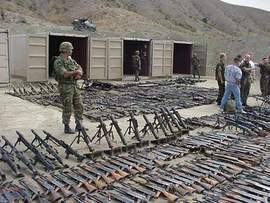Setting the scene
Violence broke out in the country when ethnic Albanian extremists challenged government authorities to grant the ethnic Albanian community more rights. On 20 June 2001, President Boris Trajkovski sent a letter to Lord Robertson, the then NATO Secretary General, to request NATO assistance in keeping civil war at bay. He wanted NATO to assist his government in demilitarising the National Liberation Army (NLA) and disarming ethnic Albanian extremists operating across the country. Diplomatic efforts and peace talks had been initiated but stalled over a series of delicate issues, including the question of whether Albanian would be recognised as an official language.
NATO adopted a dual-track approach: it condemned the attacks but urged the government to adopt constitutional reforms to increase participation of ethnic Albanians in society and politics. NATO approved the operation on 29 June, but its conditions for deployment were that the political dialogue between the various parties in the country had a “successful outcome’ and a cease-fire was respected. Only then would NATO send troops with “strong rules of engagement” to collect weapons from the ethnic Albanian extremists.
On 15 August, two days after the signature of the political framework agreement – the Ohrid Framework Agreement – the North Atlantic Council authorised the immediate deployment of the Headquarters of Task Force Harvest on the ground. This was the first of three operations to be launched:
- Operation Essential Harvest;
- Operation Amber Fox; and
- Operation Allied Harmony.
Collecting weapons
NATO officially launched Operation Essential Harvest on 22 August and effectively started operations on 27 August.
The 30-day mission aimed to disarm ethnic Albanian insurgents on a voluntary basis. Approximately 3,500 NATO troops, with logistical support, were sent to the country. Nearly 4,000 weapons and several hundred thousand more items, including mines and explosives, were collected. The operation finished on 26 September 2001.
Protecting international monitors
Following the conclusion of Operation Essential Harvest, the Allies launched Operation Amber Fox. The Operational Plan was approved on 26 September 2001 and the mission officially started the next day.
Operation Amber Fox was mandated to assist in the protection of international monitors from the European Union and the Organization for Security and Cooperation in Europe who oversaw implementation of the Ohrid Agreement.
The mission was deployed under German leadership with the participation of other NATO member countries, and consisted of 700 Allied troops joining 300 troops already based in the country. Initially, Operation Amber Fox had a three-month mandate, but it was subsequently extended until 15 December 2002.
Minimizing the risks of destabilization
In response to an additional request from President Trajkovski, the North Atlantic Council agreed to continue supporting the former Yugoslav Republic of Macedonia¹ with a new mission that would help minimise the risks of destabilisation.
While acknowledging that Operation Amber Fox could be finalised, the Council agreed that there was a requirement for a follow-on international military presence in the country.
Operation Allied Harmony was launched on 16 December and its objectives were to provide continued support for international monitors and to assist the government in taking ownership of security throughout the country.
On 17 March 2003, the North Atlantic Council decided to terminate Operation Allied Harmony as of 31 March, and to hand over responsibility for a continued international military presence to the European Union.

